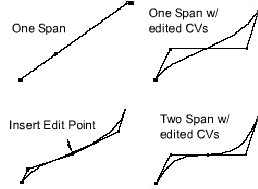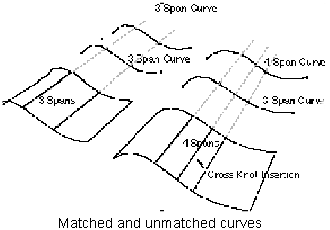To create quality surfaces you need quality curves. Use the following guidelines to help you create good curves.
Use the simplest curves that can describe the shape you want. Simpler curves mean simple, faster rendering surfaces.
One effective method for achieving simple curves is:

This iterative process ensures that your curve only has as many spans as are absolutely necessary.
You can also use the Rebuild curve tool to simplify existing curves. The tool can simplify a curve while maintaining its shape within a tolerance you set.
It is often best to build curves with uniform parameterization, because it makes inserting edit points and detaching curves at exact locations easier.
When creating curve, plan ahead to the surfaces that you want. Try to have the same number of spans in all the construction curves for building a surface. A simple way to achieve this is to start with one curve, then duplicate it to create more construction curves.
When you create a surface from curves with different numbers of spans, the new surface has an extra isoparametric curve corresponding to every extra edit point. This is known as cross knot insertion. It makes the new surface more difficult to edit and more complex.
